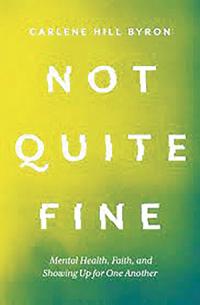What is a human life worth? What makes my own life worthwhile? Is my time valuable only when my efforts add up to some measurable achievement I can document on my résumé or in my exercise log or my family’s “brag book”? And if that’s the case, what value is there to a less productive life?
Answering those questions forces us to examine our deepest values and commitments. For those who grew up in the Christian faith, we learned from our earliest days that God sees every life as priceless. We are not free to disregard anyone, because all are essential to the whole. We must all rely on each other, and all of us together rely on God.
Still, we are often prone to value our productivity—what we can create—over our identity as God’s creations, even when we’re trying to create work for God in this world. To maximize our measurable contributions, we often overlook contributions and contributors that don’t fit our preconceived plans for success. We also can find it hard to obey God’s command to rest.
When we acknowledge that God has given value to each of God’s people, we are better able to recognize that God values even the sometimes less-productive lives of those with mental-health problems.
Finding God’s value in all lives
Theology and philosophy distinguish between relationships that are “transactional” and those rooted in “love.” Transactional relationships are like those of the market economies, defined by the metered back-and-forth flow of equivalent benefits between the two parties. A love-based relationship can be two-way, but the nature of compassion means that its benefits accrue unequally to the parties from time to time.
God’s relationship with us is the ultimate in non-transactional relationships. God expects no equivalent return from relationship with me, yet God, out of love, makes me not just a member of the household but a friend. For those in Christ, our relationships are not supposed to depend on how appealing or useful we find each other. Our relationships in Christ are intended to demonstrate the character of God’s relationship with us, where servants have become friends.
To value the personhood of an individual with mental-health challenges requires paying more attention to God’s creative work in the person than to the ways that creation has been marred. And there are times when that can be hard to do. It’s easy to see God in the person with a serious mental-health diagnosis when he’s praying daily with his pastor for their church plant. More difficult are the times when that person becomes lost in delusion and self-endangerment. It’s relatively easy to see God in the voice that breaks out in original worship song during the Sunday service. It’s more difficult when the music is banged on an out-of-tune guitar sometime after midnight on the other side of a too-thin apartment wall.
To value others for their personhood also requires believing that God so loved the person you see now—just as she is—that God was willing to sacrifice his Son on that person’s behalf, just as he did for us. And that God may have sent the Spirit already to indwell the person, despite the obvious imperfections, just as the Spirit indwells us despite our imperfections.
When we understand the value God sees in ourselves and others, we can rest. We don’t need to try to be something different or to make others be different, because we know that we and they are already enough.
We all need rest
Hard work and achievement are part of our cultural DNA. But over time, that drive has metastasized into something less laudable and more life-threatening.
Most of us know that we get cranky when we don’t have enough sleep. We aren’t able to perform our best at work or at home. Medical research tells us that sleep is foundational to good health. We also may recognize that our spiritual life suffers when we don’t rest adequately.
Steve Macchia, who teaches spiritual formation for church leaders, reminds us that when we fail to get enough rest, our souls become unhealthy and spiritually vulnerable, just as lack of rest creates easily recognized vulnerabilities in our health, performance and emotions.
Many kinds of mental-health problems are exacerbated by sleeplessness. For those who aren’t inclined to mental-health problems, snappishness or lack of focus might be a signal that more downtime is needed. For those with mental-illness diagnoses, sleeplessness can be a symptom of, or precursor to, difficult times. Extended periods of sleeplessness can be a symptom of depression. For those like me with bipolar diagnoses, a period of creative enthusiasm can launch into a multi-day binge of activity that never stops until the body either crashes or swings dangerously high.
Rest is one of the ways by which we are re-created. It is also a way in which we acknowledge and value our own true and finite selves. Resting is one of the ways we demonstrate daily that we know our accomplishments are not fully our own. God works in and through us to accomplish God’s own purposes. And God is able to accomplish those goals with or without our 24/7 involvement.
A 10th-century Roman Catholic pope expressed this humble trust in his bedtime prayer: “I’ve done the best I could in your service this day. Oh Lord, I’m going to bed. It’s your church. Take care of it!”
We need to remind ourselves: This is God’s world. We live here by God’s gracious gift. Because none of us is God, we don’t have God’s responsibility. We’re responsible for only as much as God has assigned each of us. And God can certainly manage during our times of rest.
The particular mental-health problems I have require me to rest more than many people do. My need for rest gives me something in common with friends who live with physical disabilities. They, too, often need to choose between what they want to do and what their bodily limits allow. They, too, sometimes find that their challenges place boundaries around their ambitions and dreams.
It’s important to acknowledge the limits we experience in this world. All of us—those with more challenges and those with fewer challenges—make our offerings from within our own specific limits. And we all are to be grateful together for what God has made us, individually and together.
People who live with mental-health problems face some distinct challenges in finding quality rest. First is the difficulty some experience in resting at all. Sleep is a challenge from time to time across a wide range of mental-health problems—anxiety, depression, manias and even psychotic disorders.
When we’re in the throes of a mental-health problem, we have to choose to do things that we enjoy when we’re in other states of mind, because in those moments nothing will appeal. For me, the best choices often are those that carry intrinsic rewards. Cooking a favourite recipe or baking something to share are favourite activities and also help build relationships. A long drive to a lake where I can rent a kayak, or to a forest where trails will lead to a waterfall, are other activities I choose to do when I’m trying to pull myself out of the depths.
As a person with a bipolar rushing brain, I also find that, for me, the best kinds of rest involve the opportunity to refocus. Physical activities like dance aerobics, gardening, practising piano scales, kayaking and nature photography engage multiple senses and help replace internal chaos with external order.
For congregations to encourage rest and refreshment often means to encourage all to do whatever is restful and refreshing to them, whenever they need it. When we are tempted to ask for yet more service from ones who today seem hesitant, we can release them in the knowledge there will be other chances for them to serve. And perhaps to tell them so directly: “There will be another chance. We’ll miss you, but if this isn’t a great time for you, do what you need to do. You know best.” In God’s grace, the person who accepts God’s generous gift of rest is refreshed to later give generously to others.
Look for what God sees
God has placed gifts in even the most challenged members of the flock, and they are there for the benefit of God’s people. “God has put the body together, giving greater honour to the parts that lacked it, so that there should be no division in the body, but that its parts should have equal concern for each other” (I Corinthians 12:24-25).
In other words, God gives the greatest gifts to those who would otherwise be most likely to be overlooked. The people our culture writes off for their lack of achievements are likely to be those in whom God has planted the greatest value. Ask yourself, “What is God seeing that I’m not?” And when God answers, find a way to honour the message. A note of gratitude for what you see could be a start. An opportunity for them to share that gift could come next.
The good news
The quietness and rest that people with mental-health problems need is something we all need. For us to live according to the pace and drive of contemporary western culture is for us to burn through our neural circuitry in ways that lead to disruptive and disorderly crises. For us to honour God with our lives, we need to live in ways that may seem out of step with many around us. Our most God-honouring ways of life may seem to gum up the rapidly moving machinery of busy churches.
The person who must often rest is of value. So is the person who lives endlessly in rapid motion. In fact, that very active person’s energy can help move burdens that are bringing others to a dead stop. It’s countercultural to bear one another’s burdens. It means one person’s progress may be slowed to another person’s pace so we all may finish together well. But this is the kind of life against culture that Christians have been called to from the beginning. As Paul urged the early church at Rome: “We who are strong ought to bear with the failings of the weak and not to please ourselves” (Romans 15:1).
Christians are called to nurture value in those the culture won’t value—people with disabilities, children not yet born, people who learn slowly, people whose excess energy can be disruptive, those who live in poverty, those who find themselves imprisoned, those stunned by grief. To God, a person’s value is in their personhood, not their productivity. God looks at the person less able to produce on their own and sees in that individual both a beloved part of God’s very inheritance and an opportunity for service by others using the gifts and talents God has lovingly placed in that person.
The good news is this: People with mental-health problems are a sign that God values all that God has created, even those parts of creation that carry signs of the Fall. We are a sign that God has work still to be done in this world. And those of us with mental-health problems, as well as those who live with other limits and challenges, are a sign that God calls all of us to rest.
 Author Carlene Hill Byron is a fundraiser and communicator for non-profits that serve people with disabilities and other life challenges. She also has life experience with depression and bipolar disorder. Adapted with permission from Not Quite Fine: Mental Health, Faith and Showing Up for Each Other, © 2021 by Herald Press. All rights reserved.
Author Carlene Hill Byron is a fundraiser and communicator for non-profits that serve people with disabilities and other life challenges. She also has life experience with depression and bipolar disorder. Adapted with permission from Not Quite Fine: Mental Health, Faith and Showing Up for Each Other, © 2021 by Herald Press. All rights reserved.
Mennonite Church Canada and MC U.S.A. have designated this book as the Common Read title for spring 2022. To learn more, visit commonword.ca/ResourceView/82/24012.
For discussion
1. What makes your life worthwhile? Do you believe that God values everyone equally? How much do you value yourself based on what you can accomplish? What were you taught about valuing those who are not high achievers?
2. What are the relationships in your life where giving and receiving are not in balance? How much do you value these unbalanced relationships? In what ways can those who appear less productive be making valuable contributions?
3. How would you explain the difference between transactional and non-transactional relationships? What are some examples from your own life? What does it mean to value others for their personhood?
4. Carlene Hill Byron says, “We also can find it hard to obey God’s command to rest.” Do you agree? Why can it be difficult to rest? What happens when you do not get enough rest?
5. I Corinthians 12:24 says God gave “greater honour to the parts that lacked it.” What do you understand this to mean? Who are the people with challenges in your congregation? How does the congregation show value and love to these individuals?
—By Barb Draper

The quietness and rest that people with mental-health problems need is something we all need. For us to live according to the pace and drive of contemporary western culture is for us to burn through our neural circuitry in ways that lead to disruptive and disorderly crises. (Photo by Ruth Bergen Braun)





Add new comment
Canadian Mennonite invites comments and encourages constructive discussion about our content. Actual full names (first and last) are required. Comments are moderated and may be edited. They will not appear online until approved and will be posted during business hours. Some comments may be reproduced in print.